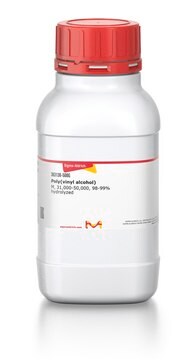D0306
DIPSO
BioXtra, pH 4.0-5.5 (20 °C, 0.1 M in H2O), ≥98% (titration)
Synonym(s):
3-(N,N-Bis[2-hydroxyethyl]amino)-2-hydroxypropanesulfonic acid, N,N-Bis(2-hydroxyethyl)-3-amino-2-hydroxypropanesulfonic acid
About This Item
Recommended Products
product line
BioXtra
Assay
≥98% (titration)
form
powder
impurities
≤0.0005% Phosphorus (P)
≤0.1% Insoluble matter
ign. residue
≤0.1%
pH
4.0-5.5 (20 °C, 0.1 M in H2O)
useful pH range
7.0-8.2
pKa (25 °C)
7.6
mp
189-192 °C (lit.)
solubility
H2O: 0.1 M, clear, colorless
anion traces
chloride (Cl-): ≤0.05%
sulfate (SO42-): ≤0.05%
cation traces
Al: ≤0.0005%
Ca: ≤0.001%
Cu: ≤0.0005%
Fe: ≤0.0005%
K: ≤0.005%
Mg: ≤0.0005%
NH4+: ≤0.05%
Na: ≤0.01%
Pb: ≤0.001%
Zn: ≤0.0005%
absorption
≤0.025 at 260 in H2O at 0.1 M
≤0.025 at 280 in H2O at 0.1 M
application(s)
diagnostic assay manufacturing
SMILES string
OCCN(CCO)CC(O)CS(O)(=O)=O
InChI
1S/C7H17NO6S/c9-3-1-8(2-4-10)5-7(11)6-15(12,13)14/h7,9-11H,1-6H2,(H,12,13,14)
InChI key
XCBLFURAFHFFJF-UHFFFAOYSA-N
Looking for similar products? Visit Product Comparison Guide
Related Categories
Storage Class Code
11 - Combustible Solids
WGK
WGK 3
Flash Point(F)
Not applicable
Flash Point(C)
Not applicable
Personal Protective Equipment
Certificates of Analysis (COA)
Search for Certificates of Analysis (COA) by entering the products Lot/Batch Number. Lot and Batch Numbers can be found on a product’s label following the words ‘Lot’ or ‘Batch’.
Already Own This Product?
Find documentation for the products that you have recently purchased in the Document Library.
Customers Also Viewed
Our team of scientists has experience in all areas of research including Life Science, Material Science, Chemical Synthesis, Chromatography, Analytical and many others.
Contact Technical Service














